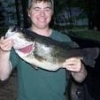With out a doubt Maine has some great bass fishing. In my own opinion it is not the amount of "pressure" that determines the quality of a fishery. It is how it is managed and the fishery itself that determines its quality. The way that the sport has evolved catch and release is practiced by virtually all bass fisherman. There a few guys that keep bass and certainly quite a few meat fisherman that do so as well. Again, in my own opinion, you don't need to look any further then the bag limits to see how Maine is managing its bass fisheries for more and quality fish. In Maine you are allowed to keep 2 fish with a minimum of 10 inches, only one may exceed 14. That is a pretty stingy bag limit in my opinion. NH bag limit is a bit more complicated and allows for the harvest of more bass and more bigger bass. Jan 1 - March 31st, 2 fish only one over 16 inches. April 1 - May 14th 2 fish no length limit. May 15th - June 15th catch and release, artificial lure only. June 16th - 30th 2 fish no length limit. July 1st - Dec 31st 5 fish no length limit. With NH regulations as they allow harvest of more and bigger bass. From July 1st you could harvest 5 fish of any size and I am sure there are individuals that are targeting and keeping 5 fish over 18 or 20 inches. Vermont's regulations aren't that much better. April 11th - June 12th catch and release. Then from June 13th to Nov 30th you are allowed to keep 5 fish minimum length of 10 inches. Again with Vermont's regulation as it is a large portion of the year you could keep 5 20" bass. I have personally seen this first hand several times on Champlain. Of the three states regulations Maine has by far the most restrictive. This allows more fish to grow to bigger size and live longer lives. Maine is effectively managing for more and bigger bass. Another aspect of tournament pressure to mention is the size of the lake or pond that is being fished. As you mentioned Bob there are 55 tournaments on Winni, most of those are smaller tournaments less then 25 boats. Winni is a big body of water though at over 55,000 acres. The fish populations in that lake is so large and spread over such a vast area. I am sure there are many unpressured fish in that lake. There are unpressured fish in every single lake. There are still many unpressured lakes in your area. I know some guys that fish them. The most popular lakes get all the attention and most of the permits. If you want to fish unpressured lakes find a dirt boat ramp or a carry top only boat ramp. Those types of places see little pressure because bass fisherman cant launch there boats there. Fishing pressure doesn't effect the size of fish that a lake produces. It does in my opinion make them more difficult to catch. Some of my biggest bass have come from a tournament pressured water in Maine. Fishing pressure isn't only about tournaments. A non tournament anglers put the same amount of " fishing pressure" on a lake. It is all relative. Fishing pressure does not effect fish size. Bass fishing in the south is year round and the amount of tournaments is mindboggling. Yet even with the near constant pressure big fish are routinely caught out of the most popular lakes. As I said earlier fishing pressure does not effect the size of bass a lake or pond can produce. It just isn't that simple. They are a product of their environment. There are so many factors that must be taken into consideration that lead to a lake being able to produce big fish or not. Some lakes simply can not produce numbers of quality bass. There are other lakes that are big bass factories. I do think that Maine is managing it Bass fisheries more effectively then NH or VT. The notion though that if you want to catch big bass just go to Maine and 6's and 7s will be jumping all over your lures is far fetched. Its not that easy. Maine does have some amazing bass fishing opportunities, no doubt about it. NH, VT, MA all have great opportunities as well as long as you know where to go and what to do. You want more and bigger bass in NH ? Ask your biologists to make the daily bag limits more restrictive.










